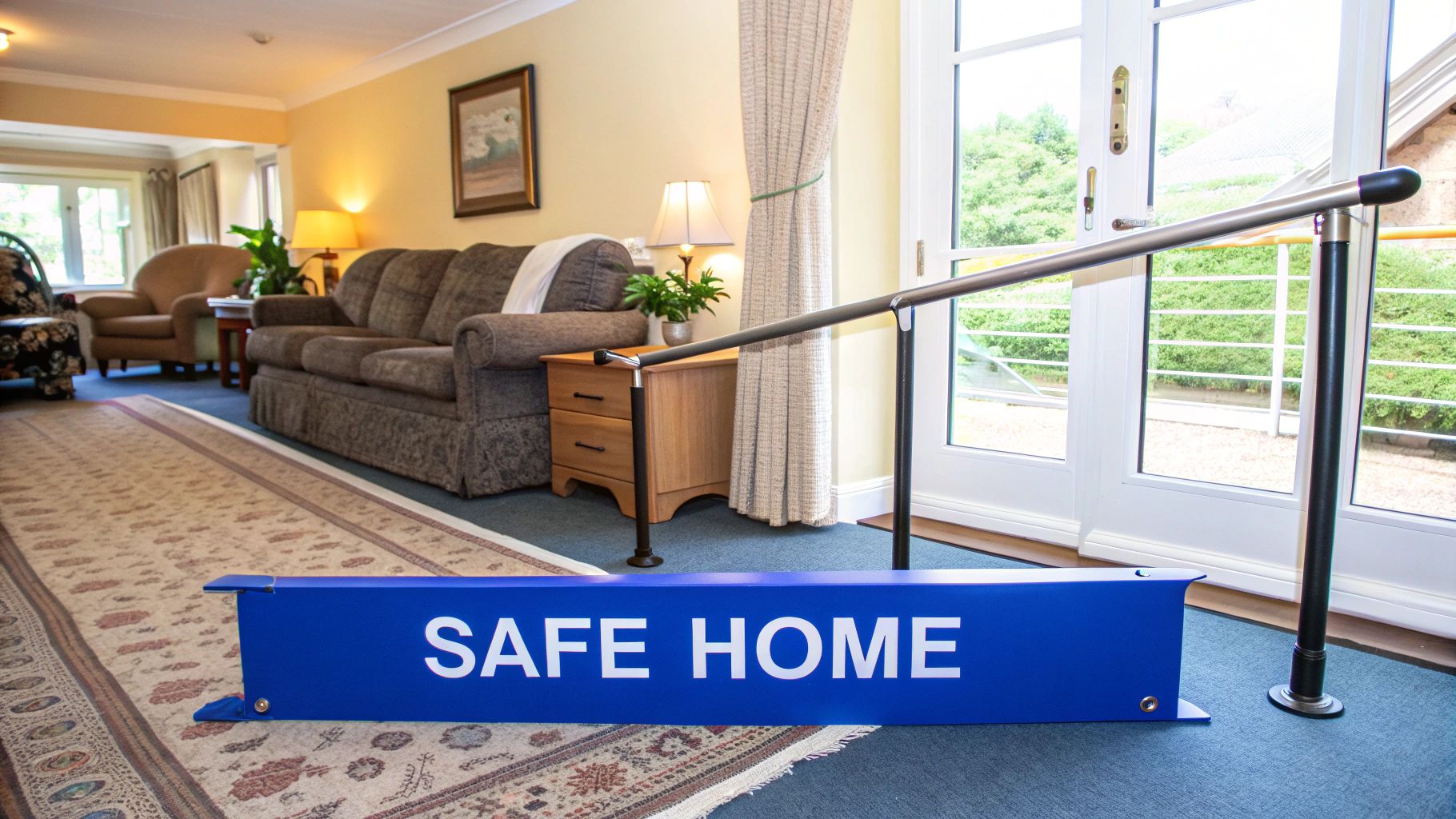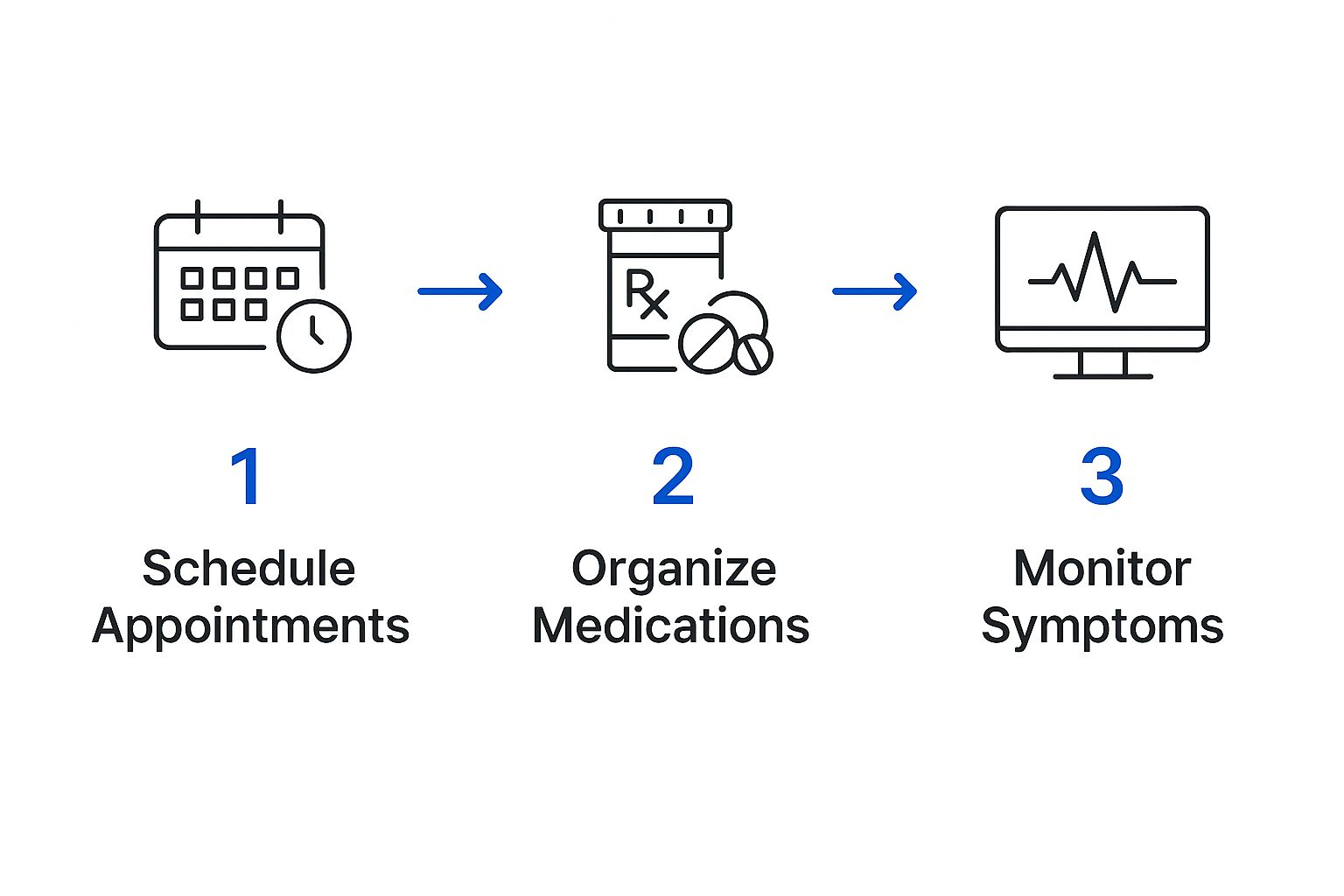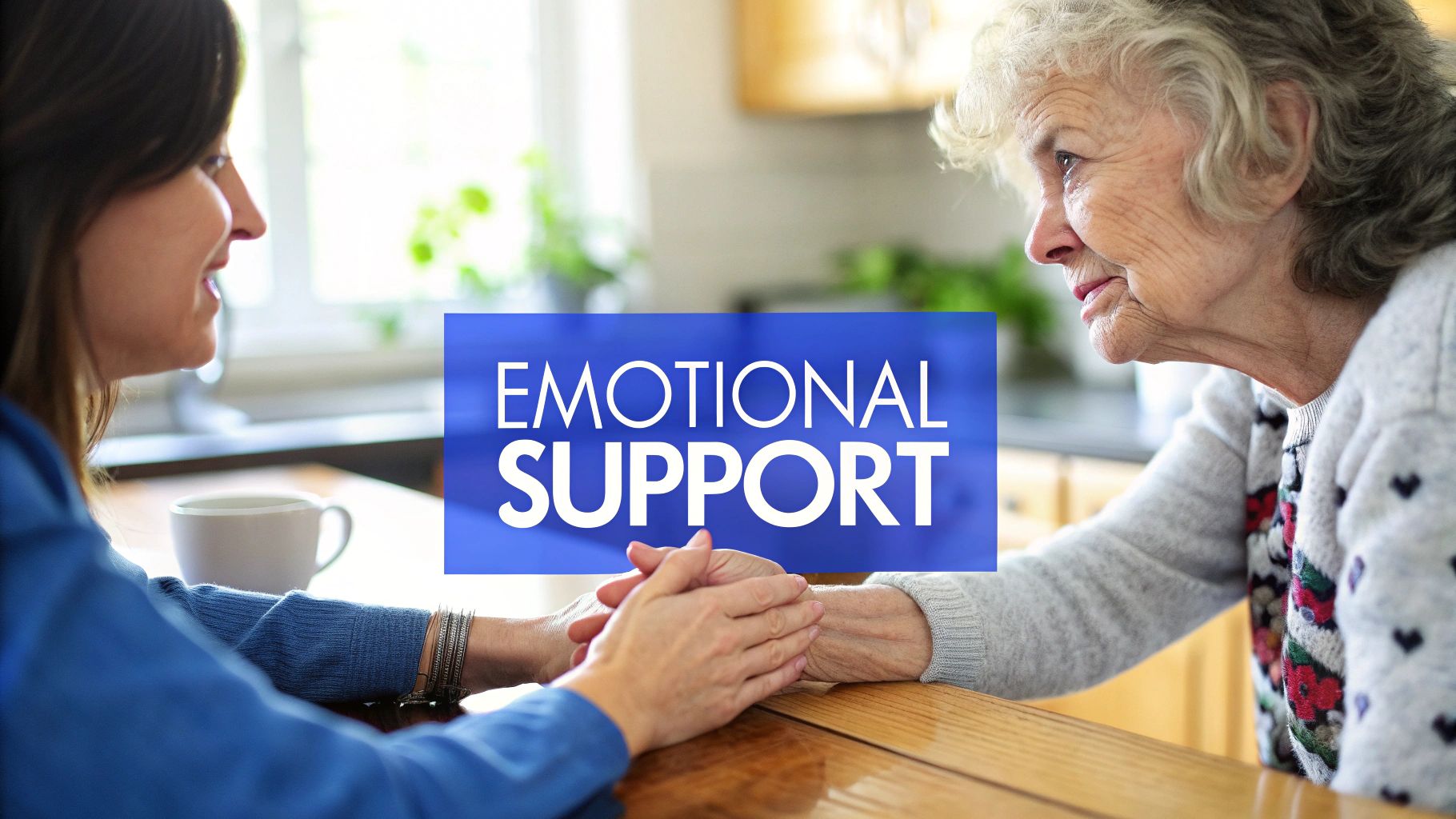Stepping into a caregiving role for your parents is a major life shift, one that’s often filled with a mix of love, duty, and real uncertainty. It’s a path that millions of us walk, and it’s completely normal to feel unprepared for the practical and emotional weight of it all. The good news? You’re not alone, and there are more resources and support systems available today than ever before.
This journey is about so much more than just keeping track of appointments or handing out medications. It's about navigating a brand-new dynamic with the very people who raised you. It demands empathy, honest communication, and a real willingness to see your parents as partners in their own care. The best, most sustainable caregiving relationships start with collaboration, not commands.
Getting the Conversation Started
Learning how to care for elderly parents isn't about following a rigid checklist; it's a journey you take with them. The absolute key is to start talking early, figure out their needs together, and build a support system before a crisis hits. When you approach it this way, what could be an overwhelming responsibility becomes a manageable process built on respect and solid planning.
How to Begin Those Tough but Necessary Talks
The first, and frankly most important, step is to just talk to your parents. Please don't wait for a fall or a scary diagnosis to force the conversation. Find a quiet, relaxed moment to bring up the future.
It's all in how you frame it. Make it clear you're planning with them to make sure their wishes are honored down the line. You could try something like, "Mom, Dad, I want to make sure we’re all on the same page for the future. What are your thoughts on getting older, and how can I be the most help to you?"
A successful caregiving journey starts with one foundational principle: partnership. When you approach care as a team effort, you empower your parents, preserve their dignity, and build a stronger, more resilient relationship for the challenges ahead.
The need for these conversations is only growing. The global elderly care market was recently valued at $1.78 trillion and is on track to hit $1.93 trillion. A big reason for this is that by 2030, one in six people worldwide will be over the age of 60. This isn't just a statistic; it's a signal that families everywhere need to get proactive. You can explore more about the evolving elderly care landscape and its market growth to understand the bigger picture.
Creating a Framework for Care
Once you've opened the door to communication, you can start mapping out the core areas of support. This isn't about you taking over. It's about you and your parents getting a clear picture of where help might be needed someday.
Here’s a helpful way to think about it and structure your talks.
This table breaks down the essential areas to focus on, giving you a clear roadmap for the conversations and planning ahead.
Core Pillars of Elderly Parent Care
| Care Pillar | What It Involves | Practical First Steps |
|---|---|---|
| Health & Wellness | Managing current health issues, medications, doctor's appointments, and promoting a healthy lifestyle. | Create a shared list of doctors, medications, and health conditions. Offer to attend a key doctor's appointment. |
| Home Safety & Independence | Assessing their living space for fall risks, making safety adaptations, and ensuring they can live independently for as long as possible. | Do a simple walkthrough of their home to spot tripping hazards. Discuss installing grab bars or better lighting. |
| Financial & Legal Planning | Understanding their financial situation, and locating important documents like a will, power of attorney, or healthcare directive. | Gently ask where important documents are kept "just in case." Discuss who is designated as their power of attorney. |
| Social & Emotional Support | Checking in on their mental health, encouraging social connections, and providing companionship to prevent loneliness and isolation. | Schedule regular, low-pressure calls or visits. Encourage them to stay involved in hobbies or social groups. |
Thinking through these pillars helps turn a vague worry into an actionable plan. It gives you a way to organize your efforts and ensures you're looking at the complete picture of your parents' well-being, not just one or two aspects.
Managing Your Parent's Healthcare Proactively

Trying to navigate the healthcare system for your parents can easily feel like a full-time job. Between multiple doctors, confusing conditions, and a dizzying list of prescriptions, just staying organized is a huge win. But it’s more than just helpful—it’s absolutely essential for their safety and well-being.
This is where you shift from being a worried bystander to a proactive healthcare advocate. It’s one of the most important roles you’ll ever take on. Your job is to create systems that catch errors, make doctor visits productive, and ensure your parents' needs and voices are always heard.
Get a Handle on the Medical Paperwork
Your first move is to create one central place for all of their medical information. This doesn't need to be a fancy app or complicated software; a simple three-ring binder or a secure digital folder works perfectly. The key is to be consistent and put everything in one spot.
Think of this as your go-to resource before any doctor's appointment and your lifeline during an emergency. It gives any new specialist or ER doctor a complete picture of your parent's health history at a glance.
Start by gathering these key documents:
- A Master List of Medications: Write down the name of each drug, the dosage, how often it's taken, who prescribed it, and why.
- A Clear Medical History: Note any major surgeries, past illnesses, chronic conditions like diabetes or heart disease, and any known allergies.
- Contact Info for All Providers: Keep a running list of every doctor, specialist, pharmacy, and therapist with their phone number and address.
- Copies of Important Papers: Make copies of their insurance cards, photo ID, and advance directives like a healthcare power of attorney.
Make Every Doctor's Visit Count
Walking into an appointment prepared can completely change the outcome. Instead of feeling rushed and forgetting what you wanted to ask, you can guide a productive conversation that covers all your concerns. It makes a world of difference.
Before you go, sit down with your parent and decide on the top three things you need to discuss. Just prioritizing like this ensures the most critical issues get addressed first. Always bring your medical binder and a notebook to jot down what the doctor says.
My biggest piece of advice? Never, ever leave an appointment with unanswered questions. If you don't understand a diagnosis, a treatment plan, or a medication's side effects, ask the doctor or nurse to explain it again. And again, if you need to. You are your parent's advocate.
For instance, if a doctor prescribes a new medication, don't just take the script and leave. Ask pointed questions: "What are the common side effects we should watch for?" and "How will this interact with the blood pressure medicine Mom is already taking?" This kind of engagement prevents dangerous mistakes.
A Smarter Way to Manage Medications
Medication mistakes are one of the biggest risks for older adults, especially those taking multiple prescriptions. In fact, up to 69% of older patients have made medication errors at home. A solid, organized system is your best defense against missed doses, accidental overdoses, or harmful drug interactions.
A weekly pill organizer is non-negotiable. Seriously, get one. Once a week, set aside time to carefully fill it, double-checking each pill against your master list. This simple routine cuts down on daily confusion and gives you a quick visual cue to see if the day's pills have been taken.
For a clearer system, you can check out our visual guide on organizing medications in our NJ Caregiving resources.
Getting Help for Complex Health Challenges
Caring for aging parents often means dealing with complex conditions like Alzheimer's, Parkinson's, or other forms of dementia. These challenges require specialized support that is often more than one person can handle alone.
This is when outside resources become so important. For example, over 237,400 people in the U.S. are enrolled in Adult Day Services Centers (ADSCs). These centers provide structured social and health support, giving family caregivers a much-needed break. You can learn more about the growth of specialized elderly care services to see how these options are expanding.
When you're managing a condition like dementia, your communication with doctors needs to be extra sharp. Keeping a log of behavioral changes, memory lapses, or confusing conversations can give the neurologist vital clues to fine-tune the care plan. Proactive healthcare management isn't just about logistics—it’s about providing compassionate, informed, and steady support through every twist and turn.
Creating a Safer Home for Aging in Place
One of the most powerful things you can do for your aging parents is help them stay in their own home, right where they want to be. The real key to making this work isn't just about comfort—it's about making their space fundamentally safe. Successfully aging in place often boils down to making small, smart changes that stop accidents before they can happen.
The best way to start is with a simple walkthrough of their home. Put yourself in their shoes and try to see the world from their perspective, keeping an eye out for challenges with mobility, vision, or balance. Your mission is to spot and eliminate those everyday hazards that could easily lead to a fall or injury. It’s a proactive step that brings peace of mind to everyone.
A Room-by-Room Safety Review
Think of it like you're a safety detective on a mission. Start with the high-traffic, high-risk areas like the bathroom and kitchen, where your parents spend most of their time. You're looking for simple fixes that deliver a big safety payoff.
In the bathroom, for example, non-slip mats for the tub and a securely installed grab bar next to the toilet are absolute non-negotiables. What about the living room? Are there loose area rugs just waiting to trip someone? Tack them down with double-sided tape or, better yet, get rid of them. If extension cords are snaking across walkways, it's time to reroute them safely along the walls.
Here are the most common spots to check:
- Flooring: Hunt down any loose rugs, frayed carpet edges, or uneven floorboards. These are major tripping hazards.
- Lighting: Make sure every hallway, staircase, and room is brightly lit. Pop some nightlights in the path from the bedroom to the bathroom for those middle-of-the-night trips.
- Stairs: Check for sturdy handrails on both sides of every staircase. If you have wooden steps, consider adding non-slip treads for extra grip.
- Kitchen: Move frequently used items to lower, easy-to-reach shelves. This simple change eliminates the need for a risky step stool. Also, double-check that the stove and other appliances are in good working order.
A safe home isn't about limiting your parents' freedom; it's about empowering it. Every hazard you remove and every thoughtful tweak you make helps preserve their dignity and independence.
This whole process of creating a safe home is really the foundation for everything else, as you can see in this chart.

Once you've got the safety piece handled, you can see how it naturally flows into managing appointments, organizing medications, and monitoring their health—it's all part of one cohesive care plan.
Using Technology for Added Security
Beyond the physical fixes, technology can add another powerful layer of safety. The market for elderly care technology is booming—it's expected to grow from $1.94 trillion to $3.29 trillion, largely thanks to smart home devices designed to help seniors live independently. These aren't complicated gadgets anymore; they're user-friendly tools you can easily bring into your parents’ home. You can read more about the trends in technology-enabled elderly care to see just how much this space has evolved.
Even simple, affordable tech can make a world of difference, especially if you're caring for your parents from a distance.
Some of the most effective options include:
- Personal Emergency Response Systems (PERS): These are wearable pendants or bracelets that let your parent call for help with one press of a button. It connects them right to emergency services or to you.
- Automated Lighting: Smart bulbs can be set to turn on at sunset or controlled with a voice command, so your parents never have to stumble through a dark room.
- Smart Smoke and Carbon Monoxide Detectors: These devices don't just sound an alarm in the house—they also send an alert straight to your phone, so you’ll know instantly if there’s a problem.
- Video Doorbells: This technology lets your parents see and talk to whoever is at the door without having to open it, which adds a great deal of security and convenience.
For more direct assistance in making a home safe, you might find our guide to personalized in-home support services helpful. By blending practical home modifications with smart technology, you can create a truly supportive environment that honors your parents’ desire to age in place with confidence.
Navigating Financial and Legal Conversations

I know, talking about money and legal documents with your parents can feel awkward, even intrusive. But trust me, avoiding these conversations is one of the biggest risks you can take. This isn't about taking over. It's about making sure your parents' wishes are known and protected, giving everyone peace of mind before a crisis hits.
Approaching these subjects calls for real sensitivity. Try framing it as a way for you to help them, making sure their life’s work and their future are handled exactly as they envision. Something as simple as, “I want to make sure I can support your wishes perfectly if I ever need to. Could we set aside some time to go over important documents so I know where everything is?” can open the door gently.
Locating the Essential Legal Documents
The first practical step is simply figuring out what legal documents exist and where they are. Having these papers in order is the bedrock of any future planning. Without them, your family could face stressful, expensive legal hurdles during an already emotional time.
At a bare minimum, you need to find, understand, and have access to a few key documents. These are the legal tools that empower you or another trusted person to act on your parent’s behalf if they can no longer make decisions for themselves.
Here are the absolute must-haves:
- Power of Attorney (POA) for Finances: This document appoints someone (the "agent") to manage financial matters if your parent can't. Without it, you might have to go to court just to pay their bills or manage their accounts.
- Power of Attorney (POA) for Healthcare: Sometimes called a healthcare proxy, this names an agent to make medical decisions when your parent is incapacitated.
- Living Will or Advance Directive: This is where your parent outlines specific wishes for end-of-life care, like their preferences on life support.
Having these conversations early is an act of love. It ensures that in a moment of crisis, you are guided by your parent’s voice and choices, not left guessing what they would have wanted. This preparation is one of the greatest gifts you can give each other.
Talking About Money and Future Costs
Once the legal papers are sorted, the next conversation is about finances. This isn't about knowing every single dollar they have. It's about understanding the big picture so you can plan for the potential costs of care. In-home assistance, assisted living, and unexpected medical bills can add up fast, and having a plan prevents panic down the road.
Start by discussing their monthly income and expenses to get a baseline. From there, you can move on to how future care costs might be covered. Do they have long-term care insurance? Are there savings or investments set aside for this purpose? What role do their pensions or Social Security play?
Unfortunately, sibling conflicts often arise when managing a parent's affairs. Misunderstandings about a Power of Attorney's role or disagreements over spending can cause lasting rifts. To help head this off, check out our guide on what to do if you feel a sibling is abusing a power of attorney, which offers tips for setting clear boundaries.
When to Bring in the Professionals
You don't have to figure all this out on your own. In fact, bringing in a neutral, third-party expert can make these discussions much smoother and more productive. Their entire job is to provide unbiased guidance for your family's specific situation.
Consider getting advice from these professionals:
- An elder law attorney can help draft or review all the necessary legal documents, like POAs and wills, making sure everything is legally sound and truly reflects your parents' wishes.
- A financial planner can assess your parents' financial health, project future care costs, and map out a sustainable strategy to pay for that care without draining their life savings.
Relying on these experts takes the emotional weight off you and your parents. It lets you focus on your relationship while they handle the complex technical details, ensuring everyone is protected and prepared for whatever comes next.
Balancing Emotional Support with Independence

Beyond sorting pills and installing grab bars, we get to the real heart of caring for our parents: their emotional health. It’s a delicate dance, this one. You’re trying to offer genuine, heartfelt support while also fiercely protecting their independence.
This part of the journey is less about ticking off a checklist and more about empathy. It's about learning to listen more than you direct.
As our parents get older, they often face a tangled web of emotions—frustration over physical limitations, fears about the future, or just plain loneliness. Your presence can be a steady anchor for them, but only if it’s offered in a way that empowers them. The goal is to avoid making them feel like a project to be managed.
Navigating Difficult Emotional Conversations
The talks you have about feelings are just as critical as the ones about medical appointments. Sadness and frustration are normal parts of aging, but many parents will bottle it up. They don't want to be a "worry" to their kids. It's on us to create a space where they feel safe enough to be honest.
Instead of a generic, "How are you?", try digging a little deeper. Something like, "I know it must be tough not being able to drive to your card game anymore. What's that been like for you?" shows you're paying attention and you're ready for the real answer.
One of the most profound shifts in this journey is learning to listen without immediately trying to "fix" everything. Sometimes, the most valuable support you can offer is simply to sit with them in their frustration or sadness, validate their feelings, and let them know you hear them.
When they open up, really listen. Put your phone away. Look them in the eye. You can reflect back what you hear with simple phrases like, "It sounds like you're feeling really lonely since the neighbors moved." This tiny act of validation can make a world of difference.
Fostering Social Connections and Engagement
Loneliness isn't just a feeling; it's a genuine health risk. Research has shown that social isolation is linked to a higher risk of everything from high blood pressure and heart disease to depression and cognitive decline. Keeping your parents connected is a vital part of their care.
This doesn't mean you have to drag them to crowded events. The trick is to build on what they already enjoy.
- Explore Local Community Centers: Nearly every town has a senior center with classes, clubs, and group meals. See if there’s a book club, a gardening group, or a painting class that might spark their interest.
- Leverage Simple Technology: A tablet can be a fantastic window to the world. You can help them set up video calls with the grandkids, find an online forum for their favorite hobby, or even play simple games with family from afar.
- Arrange Regular Visits: Consistency is key. A predictable coffee date every Wednesday or a standing Sunday dinner can become a bright spot they look forward to all week.
- Consider Companionship Services: If you live far away or are juggling a packed schedule, a companion caregiver can be a lifesaver. Professionals from agencies like NJ Caregiving can provide social interaction, join them in hobbies, and take them on outings. It’s friendship for them and peace of mind for you.
Ultimately, this is all about seeing your parent as a whole person, not just a list of needs. It's about honoring the life they’ve lived and helping them find joy and purpose in this new chapter. That's what compassionate care is all about.
Of course. Here is the rewritten section, crafted to sound like an experienced human expert and aligned with the provided examples.
You Can't Pour From an Empty Cup: Prioritizing Your Well-Being
Let's be honest: "You can't pour from an empty cup" is a phrase we hear all the time. But when you're deep in the trenches of caring for an aging parent, it becomes less of a cliché and more of a stark reality. If you run yourself into the ground, you're not just hurting yourself; you're compromising the very care you're so dedicated to providing.
Staying strong for the long haul means treating your own well-being as a non-negotiable part of the job. This isn't selfish—it's strategic. It's what allows you to be a patient, effective, and loving caregiver. The first step is learning to see the warning signs of burnout before they completely take over.
Spotting the Signs of Caregiver Burnout
Caregiver burnout is so much more than just feeling tired. It's a creeping exhaustion—physical, mental, and emotional—that can sneak up on you. It often brings a shift in your whole outlook, turning your compassion into frustration or apathy.
Sound familiar? See if any of these common symptoms are hitting close to home:
- Persistent Fatigue: A bone-deep weariness that a full night's sleep just can't seem to touch.
- Irritability and Anger: Finding yourself with a short fuse, snapping at your parent, your family, or even just yourself.
- Social Withdrawal: You've lost interest in hobbies you once loved and find yourself dodging calls from friends.
- Changes in Health: Are you getting more headaches? Stomach problems? Catching every cold that goes around?
Catching these signs early is your chance to pull back before you hit a wall. And one of the most powerful ways to do that is by embracing respite care.
Finding Relief Through Respite Care
You were never meant to do this alone, 24/7. That's where respite care comes in. It's a formal way of saying "getting a break." It provides temporary relief for you, the primary caregiver, giving you a chance to rest, run errands, or just feel like yourself again. These breaks are absolutely essential for preventing burnout.
Taking a break isn't a sign that you're failing. It’s a sign that you’re smart enough to know you need to refuel. It lets you return to your role with more patience and a better attitude, which is a gift to both you and your parent.
Respite care can look a few different ways, depending on what you and your parent need:
- In-Home Services: A professional caregiver, like those from an agency such as NJ Caregiving, can come to the house for a few hours, an entire day, or even overnight. This is a fantastic option because your parent gets to stay comfortable in their own home while you get some much-needed time away.
- Adult Day Centers: Think of these as a safe, engaging place for your parent to spend the day. They provide meals, social activities, and a structured environment, giving you a predictable block of time to handle your own life.
- Your Personal Network: Don't forget the support you might already have. Leaning on siblings, relatives, or even friends can be a lifesaver. Simply asking a brother or sister to take over for one weekend a month can make a world of difference.
At the end of the day, building these breaks into your schedule is what makes caregiving sustainable. This is a marathon, not a sprint. Taking care of yourself is how you make sure you have the stamina to go the distance.
Of course. Here is the rewritten section, crafted to sound completely human-written and natural, following all the specified guidelines.
Tackling the Tough Questions About Caring for Parents
Stepping into a caregiving role for your parents brings a flood of questions. It's a path most of us don't expect to walk, and it’s completely normal to feel a bit lost. Let's walk through some of the most common hurdles families face, with some practical advice to help you find your footing.
When Should We Discuss Care Options?
Honestly? The best time to talk about future care is before you have to. The conversation is so much easier when it’s not happening in a hospital room or after a fall. Think of it like planning for retirement—it's just another part of preparing for the future.
Try to bring it up when everyone is relaxed and healthy. Ask them what they picture for themselves as they get older. Do they want to stay in their home for as long as possible? Are they open to the idea of a senior living community down the line? Having these calm, early conversations means that when decisions need to be made, you’re not guessing. You’re working together, guided by what they truly want.
Handling a Parent Who Refuses Help
This one is incredibly common. If your parent is pushing back against help, it's rarely about you. It's almost always about their fear of losing independence, which is a deeply human feeling. The best first step is always empathy. Try to get to the root of what they're really worried about.
A parent's refusal of help isn't a rejection of you; it's often a defense of their identity and autonomy. Approaching the situation with patience and small, manageable suggestions is far more effective than trying to force a solution.
Instead of pushing a full-blown care plan, start small. Offer help with something specific that’s become a real chore for them, like hauling trash cans to the curb or tackling a tricky bit of yard work. Giving them a say in who helps or what service you use can also make a huge difference, handing back a sense of control.
If you’re still meeting a wall of resistance, sometimes bringing in a trusted third party can help. A word of advice from their family doctor or a lifelong friend might be what it takes for them to see things from a new perspective.
What Financial Help Is Available?
Figuring out how to pay for care can feel like a maze, but there are resources out there to help. What’s available will depend heavily on your parent's financial situation, where they live, and their specific health needs.
- Medicare and Medicaid: These are the big ones. It’s worth investigating what they cover, as they can sometimes help with in-home health services or skilled nursing care.
- Veteran Benefits: If your parent is a veteran, the Department of Veterans Affairs has aid programs that can support both them and their spouses. Don’t overlook this.
- Long-Term Care Insurance: Did your parents take out a policy years ago? Now is the time to find it and read the fine print.
- Local Resources: Your local Area Agency on Aging is a goldmine of information on state and county-specific programs you might not know about.
Navigating these questions is tough, but you don't have to do it all on your own. NJ Caregiving provides compassionate, professional in-home support—from personal care to giving you a much-needed break with respite services—to help you and your parents through every stage. Find out how we can support your family’s journey.



